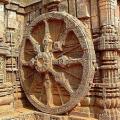39. The Wolf’s Footprint: Indian Naturalism
The Cārvāka or Lokāyata tradition rejects the efficacy of ritual and belief in the afterlife, and restricts knowledge to the realm of sense-perception.
Themes:
• R. Bhattacharya, “Cārvāka Fragments: A New Collection,” Journal of Indian Philosophy 30 (2002), 597-640. [Reprinted in his Studies, see below.]
• R. Bhattacharya, “What the Cārvākas Originally Meant: More on the Commentators on the Cārvākasūtra,” Journal of Indian Philosophy 38 (2010), 529-42.
• R. Bhattacharya, Studies on the Cārvāka/Lokāyata (London: 2011).
• D. Chattopadhyaya, Lokāyata: a Study in Ancient Indian Materialism (New Delhi: 1973).
• P. Gokhale, “The Cārvāka Theory of Pramāṇas: A Restatement,” Philosophy East and West 43 (1993), 675-82.
• D. Riepe, The Naturalistic Tradition in Indian Thought (Seattle: 1961).
Stanford Encyclopedia of Philosophy: Naturalism in Classical Indian Philosophy







Comments
Add new comment